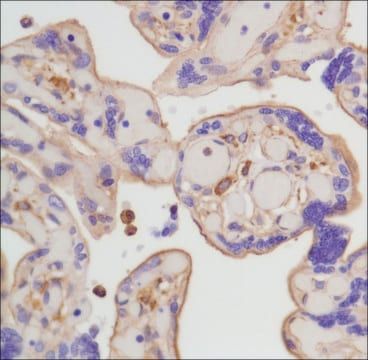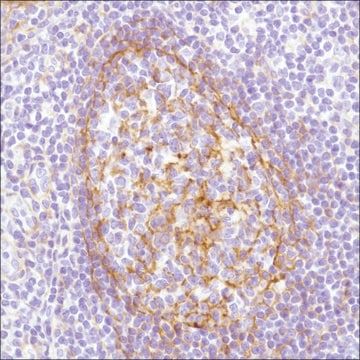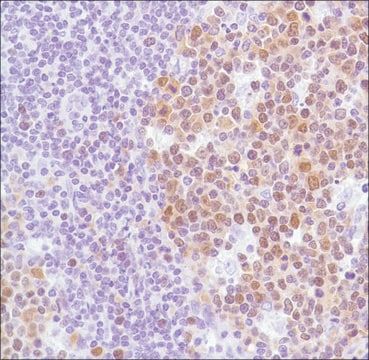SAB5300354
Monoclonal Anti-APOE antibody produced in mouse
clone 1H4, ascites fluid
Manufacturer: Sigma Aldrich
Synonym(S): AD2, LDLCQ5, LPG, MGC1571
Select a Size
| Pack Size | SKU | Availability | Price |
|---|---|---|---|
| 100 μL | SAB5300354-100-μL | In Stock | ₹ 61,904.70 |
SAB5300354 - 100 μL
In Stock
Quantity
1
Base Price: ₹ 61,904.70
GST (18%): ₹ 11,142.846
Total Price: ₹ 73,047.546
biological source
mouse
Quality Level
100
conjugate
unconjugated
antibody form
ascites fluid
antibody product type
primary antibodies
clone
1H4, monoclonal
mol wt
36 kDa
species reactivity
human
technique(s)
direct ELISA: 1:10,000flow cytometry: 1:200-1:400immunohistochemistry: 1:200-1:1,000western blot: 1:500-1:2,000
isotype
IgG1
Description
- General description: Apolipoprotein E (ApoE) belongs to a group of proteins that bind reversibly with lipoproteins. Significant quantities of ApoE are produced in liver and brain and to some extent in almost every organ. ApoE is an important constituent of all plasma lipoproteins. ApoE exists in three major isoforms; E2, E3, and E4, which differ from one another by a single amino-acid substitution. Compared with E3 and E4, E2 exhibits the lowest receptor binding affinity. E2 allele carriers have significantly lower levels of total cholesterol, low-density lipoprotein cholesterol, and non-high-density lipoprotein cholesterol, as well as increased ApoE levels. The gene encoding this protein is localized on human chromosome 19q13.32.
- Immunogen: Purified recombinant fragment of human ApoE expressed in E.coli.Mouse monoclonal antibody raised against ApoE
- Biochem/physiol Actions: In addition to facilitating solubilization of lipids, apolipoproteins help to maintain the structural integrity of lipoproteins, serve as ligands for lipoprotein receptors, and regulate the activity of enzymes involved in lipid metabolism. Apolipoprotein E (ApoE) plays an important role in lipid metabolism. It′s interaction with specific ApoE receptor enables uptake of chylomicron remnants by liver cells, which is an essential step during normal lipid metabolism. It also binds with the LDL receptor (Apo B/E). Defects in ApoE are a cause of hyperlipoproteinemia type III.
- Physical form: Ascitic fluid containing 0.03% sodium azide.
- Disclaimer: Unless otherwise stated in our catalog or other company documentation accompanying the product(s), our products are intended for research use only and are not to be used for any other purpose, which includes but is not limited to, unauthorized commercial uses, in vitro diagnostic uses, ex vivo or in vivo therapeutic uses or any type of consumption or application to humans or animals.
SAFETY INFORMATION
WGK
WGK 3
Flash Point(F)
Not applicable
Flash Point(C)
Not applicable
Compare Similar Items
Show Difference
biological source: mouse
Quality Level: 100
conjugate: unconjugated
antibody form: ascites fluid
antibody product type: primary antibodies
clone: 1H4, monoclonal
mol wt: 36 kDa
species reactivity: human
technique(s): direct ELISA: 1:10,000flow cytometry: 1:200-1:400immunohistochemistry: 1:200-1:1,000western blot: 1:500-1:2,000
isotype: IgG1
biological source:
mouse
Quality Level:
100
conjugate:
unconjugated
antibody form:
ascites fluid
antibody product type:
primary antibodies
clone:
1H4, monoclonal
mol wt:
36 kDa
species reactivity:
human
technique(s):
direct ELISA: 1:10,000flow cytometry: 1:200-1:400immunohistochemistry: 1:200-1:1,000western blot: 1:500-1:2,000
isotype:
IgG1
biological source: rabbit
Quality Level: 100
conjugate: unconjugated
antibody form: affinity isolated antibody
antibody product type: primary antibodies
clone: SP124, monoclonal
mol wt: __
species reactivity: human (tested)
technique(s): flow cytometry: 1:100immunoblotting: 1:200immunohistochemistry: 1:200
isotype: __
biological source:
rabbit
Quality Level:
100
conjugate:
unconjugated
antibody form:
affinity isolated antibody
antibody product type:
primary antibodies
clone:
SP124, monoclonal
mol wt:
__
species reactivity:
human (tested)
technique(s):
flow cytometry: 1:100immunoblotting: 1:200immunohistochemistry: 1:200
isotype:
__
biological source: rabbit
Quality Level: 100
conjugate: unconjugated
antibody form: affinity isolated antibody
antibody product type: primary antibodies
clone: SP206, monoclonal
mol wt: __
species reactivity: human (tested)
technique(s): flow cytometry: 1:100immunoblotting: 1:400immunohistochemistry: 1:100
isotype: __
biological source:
rabbit
Quality Level:
100
conjugate:
unconjugated
antibody form:
affinity isolated antibody
antibody product type:
primary antibodies
clone:
SP206, monoclonal
mol wt:
__
species reactivity:
human (tested)
technique(s):
flow cytometry: 1:100immunoblotting: 1:400immunohistochemistry: 1:100
isotype:
__



